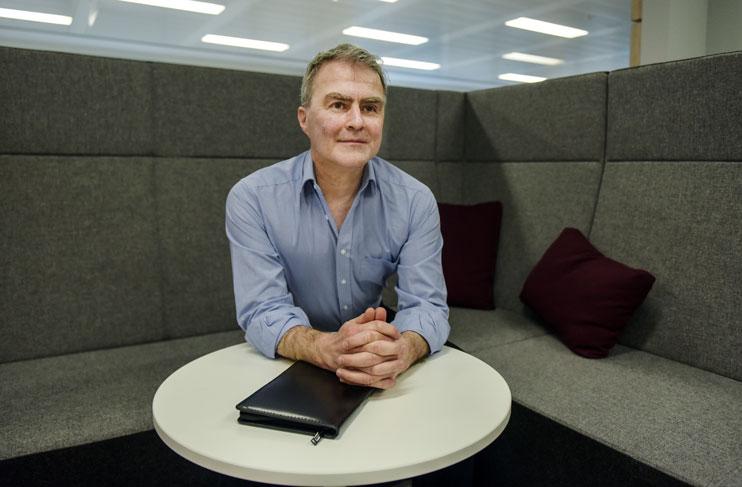Delirium's impact
Ian Holloway was completely unprepared for the effects of urinary tract infections and delirium on his late father. Gareth Bracken from Dementia Together magazine speaks to a son who hopes his difficult experiences will help others.
A man who wants to raise awareness of delirium and urinary tract infections

Ian Holloway is visiting the offices of Alzheimer's Society to talk about his father, Ernest. Ernie, as he was known to friends, had Parkinson's disease dementia and experienced regular bouts of delirium in his later years that were triggered by urinary tract infections (UTIs).
'I didn't appreciate what such a relatively trivial thing could do to an elderly person,' says Ian, who wants to raise awareness of UTIs, delirium and their impact.
Unprepared
Ernie was a trained carpenter who ran his own building and maintenance firm for 40 years, a job he loved.
'He was a very practical man who lived down the shed, sharpening tools and making and repairing things for friends and neighbours,' says Ian, a 55-year-old broadcast engineer.
In 2005 Ernie was diagnosed with Parkinson's disease, and years later he developed Parkinson's disease dementia.
'The effect was mind-blowing. It was like he wasn't my dad – he was a completely different person,' says Ian.
'For five or six years he was OK and getting on with his life, with Mum supporting him,' says Ian. 'But then he started getting more confused – perhaps that was an early sign of dementia.'
Ernie gave up driving in 2011 but was still mobile in 2014 when he first had a UTI and experienced delirium, which lasted for a couple of days.
'The effect was mind-blowing,' says Ian. 'I didn't realise how dramatic a change it could be. It was like he wasn't my dad – he was a completely different person.
'He was a reasonably quiet and private man who was calling out in the hospital. We found him lying at 90 degrees across the bed or trying to push himself out of it.
'I was unprepared for the franticness of it all.'
What is delirium?
Delirium is a treatable condition that can come on in a matter of hours or days. It has a wide range of symptoms that may include disorientation, swings in emotion, hallucinations, thoughts that aren't normal for that person or becoming withdrawn.
Although it is different from dementia, older people and people with dementia are more prone to develop delirium. It is often a person's response to an underlying medical problem, including infections such as UTIs.
If a person with dementia has symptoms that aren't normal for them or they suddenly start to behave differently, it is important to see a doctor so that the cause may be found and treated. If someone is experiencing delirium, it also helps to provide a calm and supportive environment.
Character change
Ernie experienced the symptoms of delirium again a number of times while in hospital for five or six weeks, followed by a stay in a rehabilitation unit.
'He would get obsessed with particular things, like the radiator near his bed,' says Ian. 'For a period he was fascinated about France and his sister-in-law who was over there.
'It was very distressing, seeing a completely different character within the same person. I was balancing the emotion of seeing my father like that with having to keep stable because Mum was there too.
'Dad also became practically chair-bound, which for such a practical man was upsetting to see and no doubt very frustrating for him.'
For the last 20 months of his life Ernie was cared for at home by his wife, Ian and private healthcare staff. He continued to get UTIs and experience delirium as his dementia progressed.
'His mental condition slowly got worse and worse. He would talk about random things,' says Ian. 'Thankfully it never got to the stage where he didn't know who was in his company – that would have been more traumatic.'
It was a very tough time for Ian and his family.
'When Dad went home from hospital in July 2014 I went back to my parents' house thinking I would only be lending a hand for a couple of months. But for 20 months I lived there,' he says.
'Work gave me extended leave but when I returned we had to get carers in from 9–5 to help Mum.'

Mentally drained
As well as juggling work with helping care for his father, Ian also supported his mum with the administrative side of things, including liaising with doctors, sorting out medication and escalating concerns to the community care team.
'I was mentally and physically drained. Until you've been there and done it you don't realise the strain,' says Ian.
'I was driven by my desire not to see Dad go into a care home,' says Ian. 'I wanted to keep him in his home environment as long as I could.
'It was difficult, I was mentally and physically drained. Until you've been there and done it you don't realise the strain.'
Ernie's dementia meant that he often experienced confusion, particularly during the evening. This may have been what is known as 'sundowning', when a person with dementia is more agitated or confused in the late afternoon or early evening.
'The company he ran used to have a maintenance contract with the local police, and he'd want to go to the police station to get his car out,' says Ian. 'He'd be completely focused – it could go on for about an hour. In the end I'd make a fake phone call to the sergeant to satisfy Dad.'
Having picked up another UTI in April 2016, Ernie was admitted to hospital, but the infection didn't respond to antibiotics. He died a couple of weeks later, aged 85, due to advanced dementia and Parkinson's.
Feeling helpless
During his father's later years, Ian experienced feelings of helplessness.
'I wanted the doctor to come up with a magic pill, but there isn't one,' he says.
'I always felt things weren't happening quickly enough, but then everyone's relatives have those same demands on the NHS.'
'What I needed in those initial few weeks was a mentor to steer me through, someone who had been through it all before and knew the daily trivial problems that would build up into big issues. That would have been extremely useful.'
Ian instead had to search for his own solutions to avoid further UTIs.
'I was trying to get him to drink more but the Parkinson's affected his swallowing, so he was reluctant. It was a catch-22 situation.'
'I used special cups for people with Parkinson's which had a cut-out for the nose so they could be tipped back These things helped but I had to find them myself.'

Awareness
Although he can't change his difficult experiences, Ian hopes to 'turn a negative into a positive' by raising awareness of UTIs and delirium.
'There needs to be a campaign to make people aware of how infections affect people with neurological conditions, or a campaign to make people drink more,' he says.
'Even if someone isn't thirsty, get them to maintain their fluid levels – it can keep the body free of infection.
'Obviously Dad's dementia would still have progressed, but we wouldn't have gone through the pain we did.'
Next steps
- Find out more on delirium and dementia.
- Order Caring for the person with dementia: A handbook for families and other carers (£7.99 plus postage).
- See our updated This is me tool for use with people experiencing delirium.


Sophie
saysMy sister and I have been there. We care for our father, 82, Altzheimers. Dad contracted multiple UTIs caused by bladder stones. In the end, after recurring haematuria, we had surgery, a difficult decision and traumatic experience for all of us.
Like Ian we were shocked and baffled and initially thought dads dementia has progressed to severe. We couldn't sleep for fear dad would leave the house, fall down the stairs, hurt himself. We learnt to play along with hallucinations, keep dad calm and treat the underlying cause. Often there were 2 of us, getting very tired. If you don't deal with it calmly you end up with agitation, anger and the possibility of violence. It's not dads fault! We found nearly everyone stands back from the temporary madness of a UTI. Professional were ill equipt to cope. Nurses and doctors in hospital treated us as a hazard, ran away or looked like they might call security ( we stayed 24 hrs in shifts). Even private wards won't admit someone with a UTI. Careers were often powerless - they are often told to step back, protect themselves, call for help.
Drinking fluid is critical. You can't force it so you have to be persuasive. In the end our dad needed an expert to say it would save his life, and a system - goal 6 glasses = 1.5 litres. You have to think about your loved ones character and what would persuade them. Drinking socially, slipping in cups of weak tea ( it does count), or any other non acidic liquid, the odd ice cream or lolly. It all helps. And it may need thickening, of course.
Moira Burt
saysThank you for sharing your experience with your father, it must have been terrible for you. We as a family are going through the same at the moment with our father, our mother died 5 years ago. It is very distressing and drawing on my sister and I but reading your story has helped me now to understand what is happening to our father. Thank you.